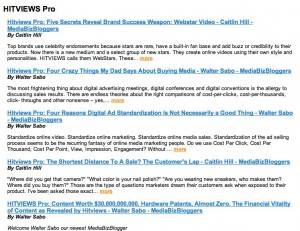Why Online Video is More Like Radio than Television
 Walter Sabo, Hitviews founder and former radio maven, makes it more apparent why radio people seem to have adapted more naturally to online video than television people. At first I thought it was simply that the radio people saw their boat sinking sooner than television people (some who vary their whistling melodies and choose a new route past the graveyard to show they’re flexible).
Walter Sabo, Hitviews founder and former radio maven, makes it more apparent why radio people seem to have adapted more naturally to online video than television people. At first I thought it was simply that the radio people saw their boat sinking sooner than television people (some who vary their whistling melodies and choose a new route past the graveyard to show they’re flexible).
In fact there’s another reason that Sabo has attracted radio investments and a posse of former radio sales people, and it’s evident in his anti-standard piece and even more succinctly in his “Four Crazy Things My Dad Said About Media Buying”:
Every radio spot he (Sabo’s father and store owner) bought was a live read by personalities. Every print ad was endorsed by a local celebrity. Every TV buy at least had live tags even though TV was too precious to offer live spokespeople. On the Internet he would have bought a webstar video visiting the business and talking about it. We all buy products from friends.
Indeed radio and today’s version of online video are arguably more alike than online video and television. Why? The talent carries the show. You may like the tunes best, but you can’t argue with the facts: when a radio star jumps stations, the audience often follows. Is it any coincidence that one of YouTube’s hottest properties is a former disc jockey (yeah the fat guy- Shaycarl). If Shay loved beets I’d eat ’em.
Online video is about a charismatic human and people who enjoy them… unscripted reality and a fairly intimate relationship (as one-to-many goes). Like radio personalities, online video folks don’t mind plugging a good sponsor. And that doesn’t work as naturally on the boob tube, except for during an occasional talk show (where’d that format come from again) or that radio-like television show we call American Idol.
I’m not entirely unbiased about Sabo’s poetry (see below graphic to find the “Hitviews Pro” series on JackMyers.com) because I have a working relationship and friendship with the radio and online-video media maven… Still, I do believe he’s the Billy May’s of online video. He cuts through a lot of the jargon and states inarguable truisms, and it’s especially charming when he quotes his dad. Get on his good side, and he’ll give you a bear hug, make you feel special, and drive two states to bring you cookies when you’re having back surgery. Get on his bad side, and he’ll pinch your brain. Either way you’ll find him more interesting than the average human, and check your pulse if you don’t find this article about why records in automobiles failed (it’s not why you’d think).
Since my blog’s been a bit slow lately, here are 5 great articles by Walter “Regis” Sabo and Caitlin “Cathy Lee” Hill. Perhaps the most fascinating aspect of Sabo is his blatant disregard for middlemen, especially media buyers. (Just once I want a media buyer to tell me how prejudice I am, and prove me wrong).


Seriously, Nalts. You need a proof reader and editor for this blog. I love you, but your spelling ang grammar leave much to be desired.
Didn’t Nalts just recently say that he used to be an editor for some magazine? They must have been desperate.
@2: Don’t remember him saying that; maybe it was a college magazine and they were desperate!
@3 Previous post, 13th comment.
I attribute talk radio to conservatives and TV to liberals.
Online et al, least in the beginning, appealed first to those two sides bearing the essence of geekdom. The professional geeks having a conservative bent – the conspiratorial geeks having a liberal bent.
Then the pop matrix set in.
Politically, there are still few in the middle, mostly strong pockets – one leaning right, towards libertarianism; Ron Paul followers being the loudest (still pictures with a message – auditory) and those leaning left; progressives video editing magicians (visual). Radio v. TV
– both sides hate commercialism; one from a moral stand point the other from an ethically standpoint.
Big Media is trying hard to treat the net like old media, but the net is not your father’s Darrin Stevens.
The net is the conglomeration of every type of communication known to man, which means everything we’ve come to expect is not as we expected and like anything new something old has to fall away. Every other media innovation from oral traditions replaced by books to the town hall replaced by TV – we’ve become more collective in our thoughts, but more isolated in our will.
In regards to advertising and as stated a gazillion times in the past – here’s were I agree and think we’re headed, which is very old media, sell soap.
Have I not been saying this for 6 years now?